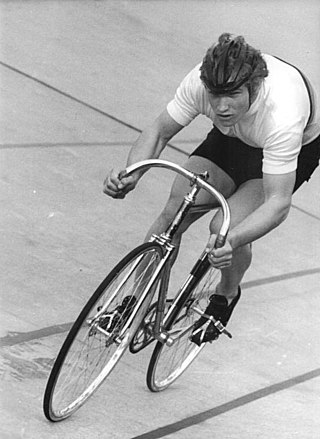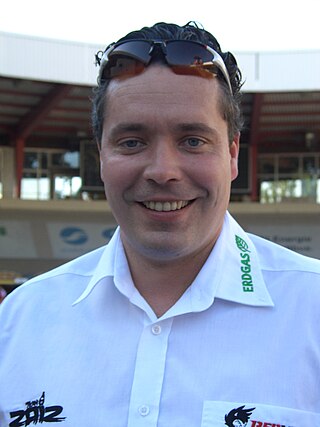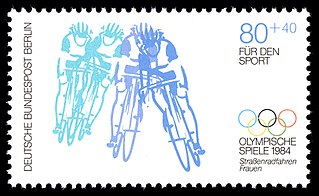
The men's sprint at the 2004 Summer Olympics (Cycling) was an event that consisted of cyclists making three laps around the track. Only the time for the last 200 metres of the 750 metres covered was counted as official time. There were 19 competitors from 13 nations, with each nation limited to two cyclists. The event was won by Ryan Bayley of Australia, the nation's first victory in the men's sprint after three times coming in second. Theo Bos of the Netherlands took silver, the Dutch team's first medal in the event since 1936. René Wolff earned bronze, stretching Germany's podium streak to four Games.

The men's track time trial was a track cycling event held as part of the Cycling at the 1964 Summer Olympics programme. It was held on 16 October 1964 at the Hachioji Velodrome. Twenty-seven cyclists from 27 nations competed, with each nation limited to one competitor. The event was won by Patrick Sercu of Belgium, the nation's first victory in the men's track time trial and first medal in the event since 1948. Giovanni Pettenella's silver medal put Italy on the podium for the event for the fourth consecutive Games, while Pierre Trentin's bronze was the first medal for France in the event since 1948.

The men's track time trial at the 1956 Summer Olympics in Melbourne, Australia, was held on Thursday 6 December 1956. There were 22 participants from 22 nations. Each competitor rode singly against the watch from a standing start. Competitors were allowed one ride only. The event was won by Leandro Faggin of Italy, the nation's first victory in the men's track time trial. Ladislav Fouček earned Czechoslovakia's first medal in the event with his silver, while Alfred Swift gave South Africa its second consecutive bronze medal.

The men's track time trial at the 1976 Summer Olympics in Montreal, Canada, was held on July 20, 1976. There were 30 participants from 30 nations, with each nation limited to one cyclist. One additional cyclist, Elmabruk Kehel from Libya, was entered but did not start because of the last-minute boycott from the African countries. The event was won by Klaus-Jürgen Grünke of East Germany, the nation's first victory in the men's track time trial. Michel Vaarten of Belgium took silver. Niels Fredborg became the only man to win three medals in the event, adding a bronze to his 1968 silver and 1972 gold.

The men's sprint at the 1976 Summer Olympics in Montreal, Canada, was held from 21 to 24 July 1976. There were 25 participants from 25 nations. Following the explosion in size of the event from 1960 to 1972 when nations were allowed two cyclists each, the limit was again reduced to one competitor from each nation. The event was won by Anton Tkáč of Czechoslovakia, the nation's first medal in the men's sprint. Tkáč beat two-time defending champion Daniel Morelon of France in the final; Morelon's silver was a (still-standing record fourth medal in the event. Jürgen Geschke earned bronze to give East Germany its first medal in the event and the first medal for any German cyclist since 1952.

The men's track time trial at the 1972 Summer Olympics in Munich, West Germany, was held on 31 August 1972. There were 31 participants from 31 nations, with each nation limited to one cyclist. One additional cyclist was entered but did not start. The event was won by Niels Fredborg of Denmark, the nation's first victory in the men's track time trial since Willy Hansen won in 1928. Denmark tied Italy and Australia for second-most gold medals in the event at 2. Fredborg was just the third man to win multiple medals in the event; he would become the only one to earn a third, in 1976. Daniel Clark's silver medal was Australia's first medal in the event since 1952. Jürgen Schütze's bronze was the first track time trial medal for East Germany as a separate nation.

The men's sprint at the 2000 Summer Olympics (Cycling) was an event that consisted of cyclists making three laps around the track. Only the time for the last 200 metres of the 750 metres covered was counted as official time. The races were held on Monday, 18 September, Tuesday, 19 September, and Wednesday, 20 September 2000 at the Dunc Gray Velodrome. There were 19 competitors from 14 nations, with each nation limited to two cyclists. The event was won by Marty Nothstein of the United States, the nation's first victory in the men's sprint since 1984 and second overall. Nothstein was the seventh man to win multiple medals in the event. The silver medal went to Florian Rousseau, France's first medal in the event since 1980. Two-time defending champion Jens Fiedler of Germany lost to Nothstein in the semifinals, but won the bronze medal match to become the second man to win three medals in the event.

The men's track time trial in Cycling at the 2000 Summer Olympics was a time trial race in which each of the sixteen cyclists attempted to set the fastest time for four laps of the track. The race was held on Saturday, September 16 at the Dunc Gray Velodrome. For the first time since 1896, a nation had more than one cyclist: Germany had two. The event was won by Jason Queally of Great Britain, the nation's first victory in the men's track time trial. Stefan Nimke's silver was the first medal for Germany since 1936. Shane Kelly, the 1992 silver medalist from Australia, became the fifth and last man to win multiple medals in the event with his bronze.

The men's track time trial in Cycling at the 1992 Summer Olympics was a time trial race in which each of the thirty-two cyclists attempted to set the fastest time for four laps of the track. The race was held on Monday, July 27 at the Velòdrom d'Horta. Adler Capelli rode a bike that allowed for a single gear change, a first for an Olympic track event. There were 32 competitors from 32 nations, with each nation limited to one cyclist. The event was won by José Manuel Moreno of Spain, the nation's first medal in the men's track time trial. The United States also earned its first medal in the event, with Erin Hartwell's bronze. Shane Kelly took Australia's second consecutive silver medal in the track time trial.

The men's sprint at the 1992 Summer Olympics (Cycling) was an event that consisted of cyclists making three laps around the track. Only the time for the last 200 metres of the 750 metres covered was counted as official time. The races were held on Tuesday, July 28, Wednesday, July 29, Thursday, July 30 and Friday, July 31, 1992, at the Velòdrom d'Horta. There were 23 competitors from 23 nations, with each nation limited to one cyclist. The event was won by Jens Fiedler of Germany, the first victory in the men's sprint for Germany as a unified nation since 1936. Gary Neiwand of Australia took silver, the third time that nation had a runner-up in the event; Neiwand was only the fourth man to win multiple medals in the sprint. Canada earned its first medal in the men's sprint with Curt Harnett's bronze.

The men's track time trial in Cycling at the 1996 Summer Olympics was a time trial race in which each of the twenty cyclists attempted to set the fastest time for four laps of the track. The race was held on Wednesday, July 24, 1996 at the Stone Mountain Velodrome. There were 20 competitors from 20 nations, with each nation limited to one cyclist. The event was won by Florian Rousseau of France, the nation's first victory in the men's track trial since 1968 and fourth overall. Erin Hartwell of the United States took silver, becoming the fourth man to win multiple medals in the event. Japan won its first track time trial medal with Takanobu Jumonji's bronze.

The men's sprint at the 1996 Summer Olympics (Cycling) was an event that consisted of cyclists making three laps around the track. Only the time for the last 200 metres of the 750 metres covered was counted as official time. The races were held on July 24 through July 28, 1996 at the Stone Mountain Velodrome. There were 24 competitors from 16 nations, with nations once again being allowed to have up to two cyclists each. The event was won by Jens Fiedler of Germany, the second man to successfully defend an Olympic sprint title. Curt Harnett of Canada also repeated as bronze medalist; he and Fiedler were the fifth and sixth men to win multiple medals of any color in the event. Marty Nothstein of the United States took silver, the nation's first medal in the event since 1984.

The men's sprint cycling event at the 1936 Summer Olympics took place on 6 and 7 August and was one of six events at the 1936 Olympics. There were 20 competitors from 20 nations, with each nation limited to one cyclist. The event was won, in a disputed final, by Toni Merkens of Germany, the nation's first medal in the men's sprint. Arie van Vliet took the silver medal, the fifth consecutive Games that a Dutch cyclist had finished in the top two. Louis Chaillot of France became the first man to win multiple medals in the event, adding a bronze to his 1932 silver; it was the fourth consecutive podium appearance for France.

The men's sprint at the 1960 Summer Olympics in Rome, Italy was held on 26 to 29 August 1960. There were 30 participants from 18 nations. For the first time since 1924, nations were allowed to have more than one competitor each ; for the first time since 1924, one nation took multiple medals. Italians Sante Gaiardoni and Valentino Gasparella won gold and bronze, giving Italy a four-Games podium streak with three total gold medals—second all-time behind France's five. Leo Sterckx's silver was Belgium's first medal in the men's sprint.
The men's track time trial at the 1968 Summer Olympics in Mexico City, Mexico, was held on 17 October 1968. There were 32 participants from 32 nations, with each nation limited to one cyclist. The event was won by Pierre Trentin of France, the nation's first victory in the men's track time trial since 1948 and third overall. In a sport where competitors rarely competed at more than one Games, Trentin was only the second man to win multiple medals in the track time trial. Niels Fredborg's silver medal was Denmark's first medal in the event since Willy Hansen's win in 1928; Fredborg would go on to be the only man to win three medals in the event. Poland earned its first ever medal in the time trial with Janusz Kierzkowski's bronze. Italy's four-Games medal streak in the event ended as Gianni Sartori took fourth.

The men's track time trial cycling event at the 1984 Summer Olympics took place on 30 July and was one of eight cycling events at the 1984 Olympics. There were 25 competitors from 25 nations, with each nation limited to one cyclist. Two other cyclists entered but did not start. The event was won by Fredy Schmidtke of West Germany, the nation's first victory in the men's track time trial and the third consecutive Games in which a German cyclist won. Curt Harnett earned Canada's first medal in the event with his silver, while France returned to the podium for the first time since 1968 with Fabrice Colas's bronze.

The men's sprint cycling event at the 1984 Summer Olympics took place from 31 July to 3 August and was one of eight cycling events at the 1984 Olympics. Once again, the limit on cyclists per nation was raised to 2. The event was won by Mark Gorski of the United States, the nation's first victory in the men's sprint and first medal in the event since John Henry Lake took bronze in 1900. The final was all-American, as Nelson Vails took silver. Japan earned its first medal in the men's sprint with Tsutomu Sakamoto's bronze. France's five-Games podium streak in the event ended.
The men's track time trial cycling event at the 1988 Summer Olympics took place on 20 September and was one of the nine cycling events at the 1984 Olympics. There were 30 cyclists from 30 nations, with each nation limited to one competitor. The event was won by Aleksandr Kirichenko of the Soviet Union, the nation's first victory in the men's track time trial. Martin Vinnicombe's silver was Australia's first medal in the event since 1972, while Robert Lechner put West Germany on the podium for the second consecutive Games with his bronze.
The men's sprint cycling event at the 1988 Summer Olympics took place from 21 to 24 September and was one of the nine cycling events at the 1988 Olympics. There were 25 competitors from 25 nations. After the 1984 Games had featured a humongously bloated 34-cyclist, 11-round, 63-match competition, the competition size was cut down by restricting nations to one cyclist yet again and instituting a qualifying round: this reduced the format to 25 cyclists, 8 rounds, and 29 matches. The event was won by Lutz Heßlich of East Germany, the 1980 gold medalist who was unable to compete in 1984 due to the Soviet-led boycott. Soviet cyclist Nikolai Kovsh took silver, the best result to date for the Soviets. Gary Neiwand of Australia earned bronze; for both the Soviets and Australians, it was the first medal in the event since 1972.

The men's track time trial event at the 1980 Summer Olympics took place on 22 July 1980 in Moscow Olympic Velodrome. There were 18 competitors from 18 nations, with one additional cyclist entered but not starting. The event was won by Lothar Thoms of East Germany, the nation's second consecutive victory in the men's track time trial. Aleksandr Panfilov of the Soviet Union took silver, the nation's first medal in the event since 1960. David Weller's bronze remains—through the 2020 Games—Jamaica's only medal outside of track and field athletics. Denmark's three-Games medal streak ended.














